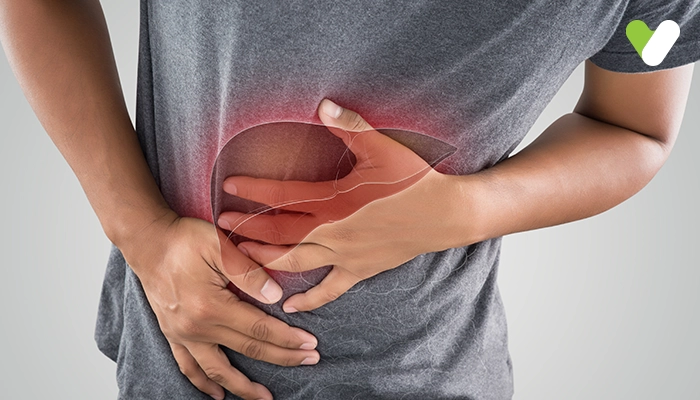Fatty liver diseases are quite prevalent today. Studies suggest about 24% of U.S. adults have Non-Alcoholic fatty liver disease (NAFLD). It most likely affects people with obesity or types 2 diabetes.
In this article, we'll talk about fatty liver diseases and how a proper diet, good exercise and planned weight loss can help patients suffering from acute liver diseases.
What Is a Liver?
An organ about the size of a football sitting right under your ribcage on the right side of your abdomen is your liver. It helps properly digest food and removes all unwanted toxic substances from your body. In addition, the liver produces bile, a protein that breaks down fat into fatty acids that help in easy digestion.Liver diseases such as fatty liver can be inherited or because of an unhealthy lifestyle that may damage your liver, including viruses, alcohol overuse, or obesity.
A widespread variant of fatty liver disease is Non - alcoholic fatty liver disease NAFLD. It's a common condition in people suffering from obesity or type 2 diabetes. A person may store excess fat in the liver, resulting in cirrhosis and liver failure.
The first line of treatment for NAFLD is weight loss through calorie reduction, exercise, and healthy eating.
Symptoms of Fatty Liver
Liver diseases do not necessarily come with visible signs and symptoms. The most common symptoms you can look out for include:- Jaundice
- Pain in the abdomen or swelling
- Swelling in the legs and ankles
- Itchy skin
- Dark urine colour
- Pale stool colour
- Chronic fatigue
- Nausea or vomiting
- Loss of appetite
- Tendency to bruise easily
Causes of Fatty Liver
Infection: the most common type of liver infection includes Hepatitis ABC. These viruses or parasites infect the liver, causing intense inflammation and reducing its functioning capacity.Abnormal immune system: certain diseases reduce your body's immunity and ultimately attack specific parts of your body, including your liver. Examples include:
-
- Autoimmune hepatitis
- Primary biliary cholangitis
- Primary sclerosing cholangitis
-
- Hemochromatosis
- Wilson's disease
- Alpha-1 antitrypsin deficiency
-
- Liver cancer
- Bile duct cancer
- Liver adenoma
-
- Chronic alcohol abuse
- Fat accumulation in the liver (nonalcoholic fatty liver disease)
- Specific prescription or over-the-counter medications
- Certain herbal compounds
Diet for fatty liver disease
- Fruits and vegetables
- High-fibre plants like legumes and whole grains
- Significantly reducing intake of certain foods and beverages, including those high in added sugar, salt, refined carbohydrates, and saturated fat
- No alcohol: Alcohol can be a significant cause of fatty liver disease and other liver diseases.
- Coffee: caffeine can help reduce the number of abnormal liver enzymes in your body and help you protect against NAFLD
- Green leafy vegetables: spinach specifically, can lower the risk of NAFLD, possibly due to nitrate and distinct polyphenols found in leafy vegetables
- Fish: fish variants such as salmon, sardines, tuna, and trout have high amounts of omega-3 fatty acids that may help reduce liver fat boosting protective HDL cholesterol and lowering triglyceride levels.
- Oatmeals: fibre-rich food that includes oatmeal is associated with reduced NAFLD-related diseases.
Typical Diet Plan For Fatty Liver
Breakfast: hot oatmeal with two tablespoons almond butter, one tablespoon chia seeds and 1 cup mixed berries along with one cup of black coffee or teaLunch: spinach salad and grilled chicken, baked potato, and a cup of cooked broccoli, carrots and other vegetables.
Snack: 2 tablespoon hummus with raw vegetables
Dinner: Half a plate of small mixed bean salad with grilled salmon along with one cup of cooked broccoli, quinoa and mixed berries (each)
Essential Element to Treat Fatty Liver Is Weight Loss
It's not easy, but one can maintain a healthy lifestyle with discipline and corrective measures. For example, researchers have seen that losing 10% of your body weight can help reduce accumulated fat around your liver. Another essential point to take care of is to ensure that weight loss happens gradually, i.e. 0.5 to 1kg in a week. Experts suggest sudden weight loss can lead to more pressure around the liver that can cause further damage.If you're connected with a health care specialist, they may suggest a simplified weightless regime that combines the proper diet and proportionate exercises. Experts suggest a minimum of 150 minutes of heart-pumping activity per week is essential. In addition, many prefer 20-25 minutes of Zumba or cardio a day, the best way to stay in the plan.
Resistance or strength training that includes weight lifting can significantly impact fatty liver diseases. Your ideal schedule must consist of 30-60 minutes of aerobic exercises for at least five days a week and mid to high-level strength training three days a week. While talking about nonalcoholic fatty liver disease, a brisk walk or a jog is also enough to help.
Another way to reduce body weight is through a weight loss surgery like a gastric sleeve or gastric bypass that can be considered.
